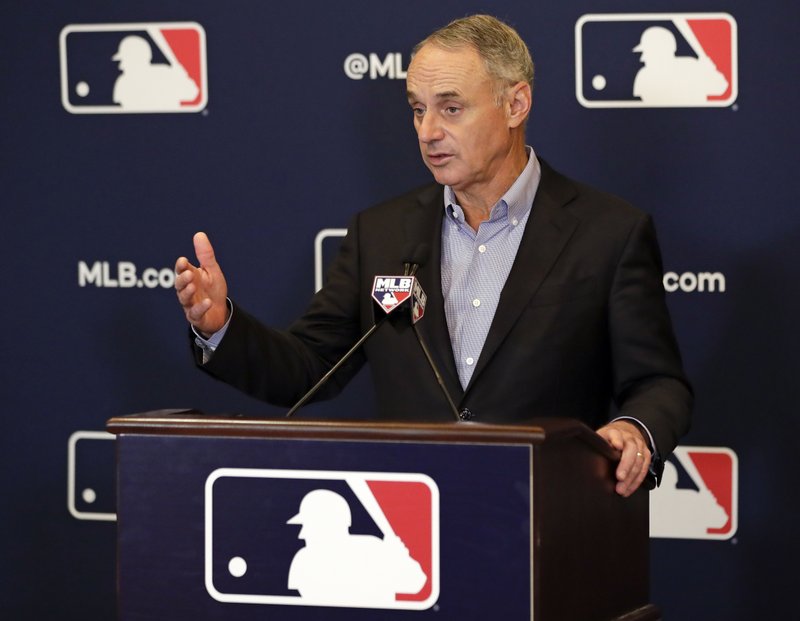
File-This Feb. 8, 2019, file photo shows Rob Manfred, commissioner of Major League Baseball, speaking during a news conference at owners meetings in Orlando, Fla. Major League Baseball and the players’ union are near an agreement to expand active rosters by one to 26 starting in 2020 as part of a deal that would include a commitment to discuss larger economic issues after opening day. (AP Photo/John Raoux, File)
NEW YORK — Major League Baseball and the players’ union are near an agreement to expand active rosters by one to 26 starting in 2020 as part of a deal that would include a commitment to discuss larger economic issues after opening day this year.
As part of the deal, the active limit from Sept. 1 to the end of the season would be lowered from 40 to 28 beginning next year, people familiar with the negotiations told The Associated Press. The people spoke on condition of anonymity because the agreement had not yet been finalized.
A limitation on September call-ups would end parades of relief pitchers that cause some games to stretch on.
There would be a maximum of 13 pitchers for most of the season and 14 from Sept. 1 on, the people said. The minimum roster size would increase from 24 to 25.
The new 26-player maximum also would apply to the postseason.
The commitment for a discussion of the larger economic issues is a key for the union after consecutive slow free-agent markets that have seen dozens of players sign on the eve of spring training and after workouts were underway. Players have proposed changes such as expanding the designated hitter to the National League and altering the amateur draft to discourage the number of teams jettisoning veterans during a season in favor of rebuilding.
Baseball’s collective bargaining agreement is set to expire at the end of the 2021 season, and management appears willing to negotiate larger changes in exchange for a longer term.
The agreement also would include:
—increasing in the regular injured list minimum for pitchers and the minimum option recall time for pitchers from 10 to 15 days beginning in 2020.
—starting extra innings of the All-Star Game with a runner on second base.
—giving MLB the right to shorten between-inning breaks.
The union planned to reject MLB’s proposal for a three-batter minimum for pitchers, leaving MLB with the right to implement that unilaterally for 2020. Baseball Commissioner Rob Manfred has said he is reluctant to change playing rules without an agreement with players.
MLB agreed not pursue a pitch clock through the 2021 season.
The roster deal is similar to one that had been slated to be included in the November 2016 collective bargaining agreement but came undone when the union backed away.
The roster size settled at 25 more than a century ago. Teams had 25 players active starting in 1913, according to Baseball Almanac, and since 1909, according to Peter Morris’ “A Game of Inches.” Morris wrote the limit was lowered during World War I, then reverted to 25, then cut to 23 in 1931 because of the depression. The maximum was waived at the end of World War II and again in 1949 because of players returning from the Mexican League, Morris wrote.
The 25 maximum through Aug. 31 has been a part of the collective bargaining agreement since the first labor deal in 1968. Teams have usually been at the maximum, except for the collusion era of 1986-89, when all clubs went with the 24-man minimum.
A 26th player has been allowed for some day-night doubleheaders since 2012. The expansion of the active roster to 40 each Sept. 1 led to complaints from teams and players that opponents were contesting games with unequal-sized squads based on how many minor leaguers had been called up.